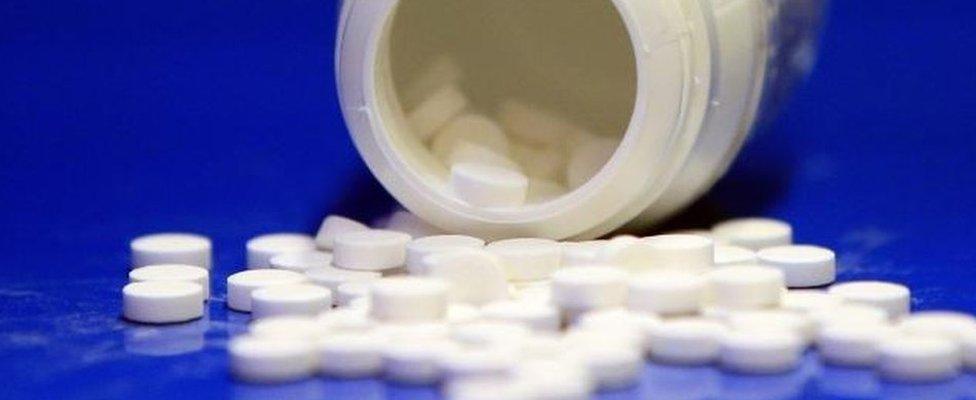NHS overcharged by millions for key drug, says watchdog
- Published
- comments
Dr Mark Vanderpump told the BBC patients were seeing liothyronine sold for £5 in other European cities
Drug company Concordia overcharged the NHS by millions for a key thyroid treatment, the Competition and Markets Authority has provisionally found.
The CMA said that last year the NHS spent £34m, external on its drug, liothyronine, up from about £600,000 in 2006.
The amount the NHS paid per pack rose from around £4.46 in 2007 to £258.19 by July 2017, an increase of almost 6,000%.
Concordia said, external it did "not believe that competition law has been infringed".
The price change occurred in the years after the drug was de-branded in 2007. The CMA said the price rise took place despite "broadly stable" production costs.
Canadian drugs giant Concordia sells drugs to patients in more than 100 countries.
Liothyronine tablets are primarily used to treat hypothyroidism, a condition caused by a deficiency of thyroid hormone affecting at least two in every 100 people and which can lead to depression, tiredness and weight gain.
Until earlier this year, Concordia was the only supplier of the drug.
CMA chief executive, Andrea Coscelli, said: "Pharmaceutical companies which abuse their position and overcharge for drugs are forcing the NHS - and the UK taxpayer - to pay over the odds for important medical treatments.
"We allege that Concordia used its market dominance in the supply of liothyronine tablets to do exactly that."

Analysis: Michelle Roberts, BBC News Online health editor

Prescription medicines that are still under patent can be expensive, but the government caps profits from any that are sold to the NHS to keep costs low.
But this system does not cover so-called "generic medicines", where a drug's patent has run out.
The loophole means the price of older, established drugs coming off patent can rocket.
A company, after filing and obtaining appropriate approval, can start trading the rebranded medicine and set a high price for it through a process known as "debranding".
It's something the Competition and Markets Authority has challenged a number of drugs companies over.

'Open and transparent'
Mr Coscelli stressed that, at this stage in the investigation, the findings were provisional and there had been no definitive decision that there had been a breach of competition law.
Concordia said the pricing of liothyronine had been conducted "openly and transparently with the Department of Health in the UK over a period of 10 years".
"Over that time, significant investment has been made in this medicine to ensure its continued availability for patients in the UK.
"We continue to work co-operatively with the CMA as it proceeds with its investigation."
It added that the CMA's statement included matters that pre-dated Concordia's ownership of its international segment, which it bought in 2015 from investment firm Cinven and other sellers, including Hg Capital. The CMA has also written to those two firms.

"I get some from Greece, some from Mexico"

Before she started taking liothyronine, Tara Riddle said her life was "utter, utter exhaustion".
She told BBC 5 live: "I had to lean on something, rather than stand, I couldn't go out, I couldn't shop. It was awful, absolutely awful."
Having researched her condition online she convinced her GP to prescribe her liothyronine which she took for four weeks.
"My life came back completely," she said. "Then I called my GP and he said 'I am so, so glad, but I'm afraid I am not allowed to to give you any more because they are so expensive.'"
Tara is now forced to buy the drug overseas via the internet.
She said: "I get some from Greece, some from Mexico. I talked to my MP about it and he said they could be dirty drugs, and I said I know, but I said I wasn't going to go back to that bad place I was in.
"The NHS is paying around £900 for 100 tablets, and in Greece and Turkey they can be got for about £3. The NHS is paying way, way too much and there's something wrong."

'Massive difference'
An NHS England spokesperson said: "This action sends an important enforcement signal to relevant generic drug manufacturers, and also wholesalers, that taxpayers and the NHS will not tolerate market abuses."
Dr Mark Vanderpump, former president of the British Thyroid Association, explained how he saw the cost of liothyronine rocket: "Historically the drug cost the NHS about £20-30 a month. The new cost was over £300 a month.
"Patients were telling me they could go to a foreign capital and pay about £4-5 a month, so there was a massive difference in what the NHS was being charged versus what people were accessing it at at a European level."
If the provisional finding is upheld the CMA can impose a fine of up to 10% of Concordia's annual worldwide turnover.
Earlier this year, Concordia was also accused of pushing up the price of a "lifesaving" NHS drug by striking a deal not to compete with another firm.
The CMA said in provisional findings, external that Actavis and Concordia fixed the market for hydrocortisone tablets. Concordia also said then it did not think it was in breach of competition law.
More investigations
The CMA said the liothyronine case was one of a number it was looking at within the pharmaceutical sector.
Previously, the watchdog has fined drugs giant Pfizer and Flynn Pharma nearly £90m in relation to what it called "excessive and unfair prices" for the anti-epilepsy treatment, phenytoin sodium capsules.
It also fined a number of pharmaceutical companies a total of £45m in relation to anti-depressant medicine paroxetine.
Both those decisions are under appeal.
The CMA is pursuing another seven investigations into several companies in relation to drug pricing and competition issues.
- Published1 November 2017

- Published3 March 2017

- Published22 October 2017
